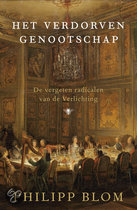HET VERDORVEN GENOOTSCHAP. Philipp Blom.
Vertaling Pon Ruiter.
 Beschrijving (bol.com)
Beschrijving (bol.com)
Dit is het bijzondere verhaal van de achttiende-eeuwse Parijse salon van Baron Thiry d'Holbach, waar de grootste geesten van die eeuw – Diderot, Hume, Rousseau – samenkwamen. De radicale filosofie die tussen 1750 en 1770 in deze salon tot bloei kwam, is van historisch belang geweest voor de ontwikkeling van het sceptische moderne denken. Het huis van d'Holbach was een waar internationaal epicentrum van intellectuele moed en revolutionaire ideeën in een tijd waarin openlijke twijfel aan de waarheid van religie levensgevaarlijk was. Deze mensen waren de eerste atheïsten. Blom verbindt de levensverhalen van de verschillende gasten van de salon met de ontstaansgeschiedenis van hun ideeën. Hij vertelt over de onderlinge vriendschappen, waarvan sommige in diepe afkeer, zelfs haat eindigen – bijvoorbeeld die tussen Diderot en Rousseau – alsof hij de mensen zelf heeft gekend.
Uit de pers:
Trouw. 'Blom doet de verschillen tussen Diderot en d’Holbach goed uit de doeken. Hij maakt duidelijk hoe moedig zij waren, hoever hun invloed ging, en hoe belangrijk zij ook voor ons zijn. (…) Een hartverwarmend boek.’
NRC Handelsblad. 'Erudiet, fris geschreven boek'
The Perseus Books Group. 'A startlingly relevant work of narrative history, A Wicked Company forces us to confront with new eyes the foundational debates about modern society and its future.'
David Andress, author of The Terror and 1789. “A Wicked Company offers an entertainingly brisk introduction to some of the more intriguing byways of the Enlightenment, and in particular a humane and engaging portrait of Diderot, a man of startlingly modern ideas constrained by his humble circumstances to an almost-stifling public discretion.”
Kirkus Reviews. “Historian Blom returns with a flowing, limpid account of an 18th-century French salon that housed the greatest names in French philosophy…. A swift, readable reminder that ideas are exciting – and have consequences.”
Mike Rapport, author of 1848: “A bold book. In A Wicked Company, Philipp Blom recaptures some of the limelight from the most famous figures of the French Enlightenment – Rousseau and Voltaire – by arguing that the more radical ideas of Diderot and Holbach would have more resonance in our own times. Written with pace and verve, the book evokes the vibrancy of the Parisian salons, bringing the protagonists to life – Diderot, Holbach, Rousseau, Hume, Madame de Geoffrin – and puts flesh-and-blood into the story of eighteenth-century intellectual debate. While challenging the usual pantheon of Enlightenment thinkers, the book offers a lively and readable entry into the wider world of elite culture and ideas in the heady, exciting decades before the French Revolution.”
Wall Street Journal. “Mr. Blom skillfully evokes the characters of these young men…. Mr. Blom’s coupling of the lives of the philosophers with their thought helps make their ideas less desiccated than they might otherwise have appeared in the hands of a more academic writer. He has an admirable ability to get to the heart of what Spinoza, Hume or Voltaire argued.”
The Economist. “Tells the story of a set of remarkable individuals on the radical fringes of the 18th-century European Enlightenment, whose determinedly atheistic and materialist philosophies denied the existence of God or the soul…. [P]art biography and part polemic…it is also an iconoclastic rebuttal of what he describes as the ‘official’ history of the Enlightenment, the sort of history that he finds ‘cut in stone’ on a visit to the Paris Panthéon. There the bodies of Voltaire and Rousseau were laid to rest with the blessing of the French state. Neither deserved it, suggests Mr Blom.”
Booklist. “Blom here returns to the field of an earlier triumph…to take the measure of Encyclopedie’s editor, Denis Diderot…. A perceptive, readable portrayal of a seminal coterie in the history of ideas.”
Library Journal. “Blom reminds us that some 18th-century reformers were thoroughgoing materialists, scoffing at religion, even deist religion, and criticizing an oppressive, irrational society.”
 Beschrijving (bol.com)
Beschrijving (bol.com)

